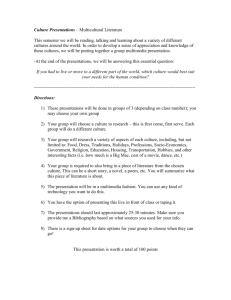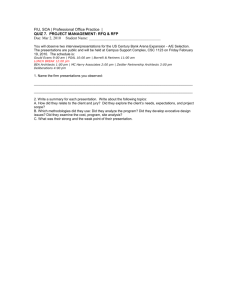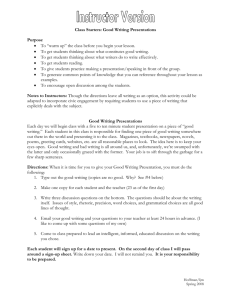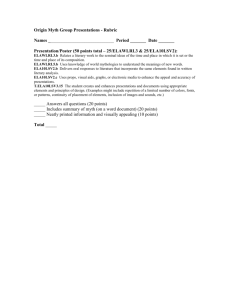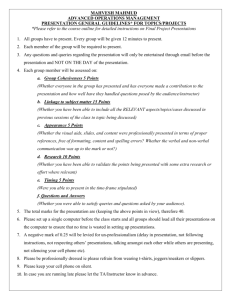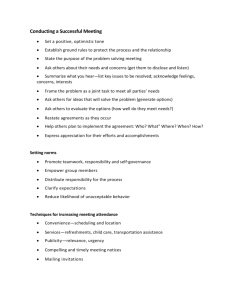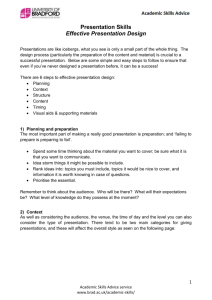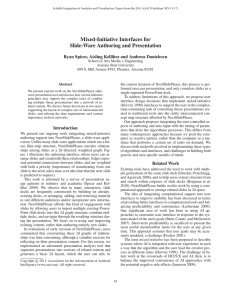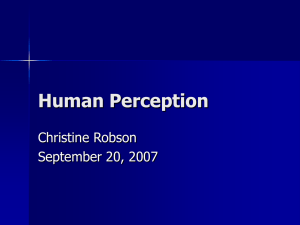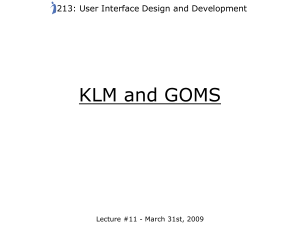Document
advertisement
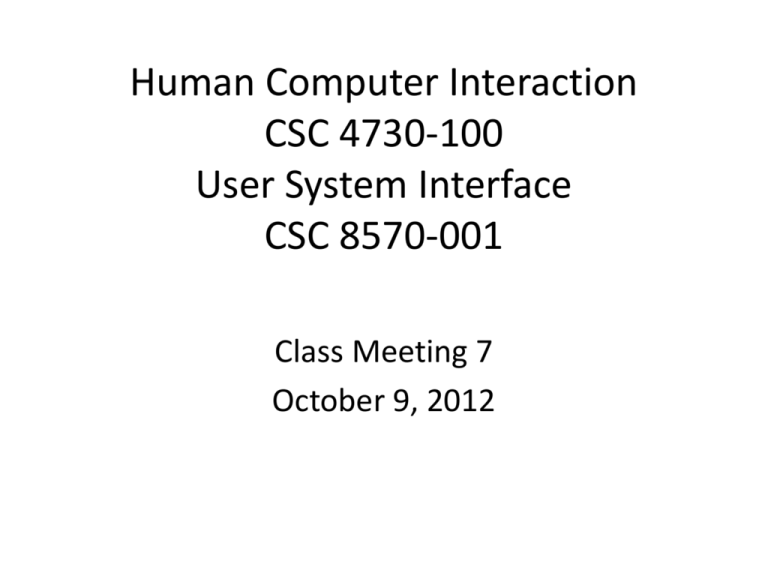
Human Computer Interaction CSC 4730-100 User System Interface CSC 8570-001 Class Meeting 7 October 9, 2012 Important Concepts As listed on the one-minute survey • • • • • • • • • • • • • Research methods for testing usability Requirements specifications for interfaces must be written carefully and followed exactly. GOMS analysis of user interaction Types of measurements available for keyboard entry process Preparing a research experiment Diversity of interfaces; complexity of UI design Keys to creating an excellent interface: innovation, analysis of current UI problems User interface assessment with GUEPs and CDs Specific GUEPS and CDs including Consistency, KISS, Viscosity, Explaining Keystroke level analysis, models (e.g. Fitts’ Law), and notation Semantic and syntactic analysis of widgets Mental models Learning tools: concept maps, research paper reading process Confusions • • • • • • Picking essential ideas with final exam in mind The gesture analysis Formal notations for keystroke-level actions Understanding and, especially, use of GUEPs Understanding and, especially, use of CDs Understanding and use of GOMS model – GOMS analysis of the table building exercise • Identifying good HCI research • Statistics for the research project • Concept maps Gesture Analysis The Mac and iPad revisited Looking at the table Car Key Analysis States: • Horn/lights: Beep/Flash vs. No Beep/No Flash • Driver’s door: Locked vs. Unlocked • Passenger’s doors: Locked vs. Unlocked • Trunk: Closed vs. Open Car Key Analysis (2) Buttons: All are momentary contact • Panic • Door unlock • Door lock • Trunk open Car Key Analysis (3) • Are all 16 states possible? – Make a list of the possible states. – Can the list be decomposed into disjoint lists? • Working from the list of possible states – How many (state, transition) pairs are there? – How many (state, transition) state actions are possible? – Create the formal FSM model. Article Presentations • Choose one of the three topic areas (defined below) • Find an interesting recent (last 4 years) paper in the area • Prepare a 15 minute presentation of the paper – – – – – The background The experiment The results The critique The relationship to other papers or concepts Article Presentations (2) Subject areas: • The user experience (UX), its formal study and its relation to interface design. • Intelligent user interfaces (IUI) and especially the implementation and evaluation of features. • Interface personalization and especially its value on small devices. Another Formal Model: PIE To follow along, • On your laptop, start the calculator in standard view • Start a browser and display a page with a number of links, say www.villanova.edu Now turn to the PIE Model handout Course planning • 10/16 – Fall break • 10/22 (Monday) – Choice of research article for presentation with area and bibliographic information due, via email • 10/23 – Interface design exercise: specs • 10/30 – Interface design exercise: team meetings • Preliminary interface design report due at end of class • Research project Progress Report 1 due • 11/6 – Topics to be determined • Final interface design report due • 11/13 – No class • 11/20 – Paper presentations: User Experience (UX) • Research project Progress Report 2 due Course planning (2) • 11/27 – Paper presentations: Intelligent user interfaces (IUI) • Draft research report, part 1, due • 12/4 – Paper presentations: Interface personalization (IP) • Draft research report, part 2, due • 12/11 – Research Project Presentations • Final research report due • 12/18 – Final Exam • Research project poster abstract and design due Research Project 1. IRB forms (due now) 2. Progress reports (PR 1 due 10/30; PR 2 due 11/20) 3. Report drafts (Intro sections due 11/27; Results sections due 12/4) 4. Final written report (Due 12/11) 5. Oral report (Given 12/11) 6. Poster abstract and design (Due 12/18) To Do • Submit presentation area and article for approval by Monday, October 22. Send area and bibliographic citation by email.


